Back to AgBioFEWS home
Meet Our Students
AgBioFEWS Fellows are Ph.D. candidates across multidisciplinary fields of study. In addition to their primary graduate program, Fellows also earn a graduate minor in Genetic Engineering and Society and:
- Embark on their studies embedded with NC farms, with later opportunities for international internships
- Collaborate on an interdisciplinary cohort project
- Take advanced interdisciplinary graduate courses and incorporate AgBioFEWS into thesis
See also: AgBioFEWS 2020 Cohort
See also: AgBioFEWS 2022 Cohort
2019 Fellows
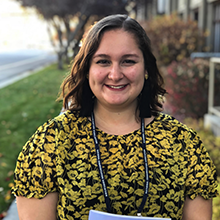
Carrie Clower
Communication, Rhetoric and Digital Media
Ph.D. Student | College of Humanities and Social Sciences | Location: Thomas Hall 1549 | cclower@ncsu.edu| LinkedIn | CV
What AgBioFEWS means to me: “Being an AgBioFEWS fellow means contributing to interdisciplinary research and scholarship on agricultural systems with broad implications for the entire country as well as localized significance within North Carolina.”
Carrie is a first year doctoral student in Communication, Rhetoric, and Digital Media. Her primary interest is in quantitative science communication, and she researches public perceptions of scientific topics. Her previous work focused on climate change, and her current projects involve genetic modification of crops and animals, GMO labeling, and severe weather warning systems. She graduated from The University of Alabama in 2017 with Bachelor’s degrees in Political Science and Communication Studies and earned her Master’s in Communication Studies there the following year.
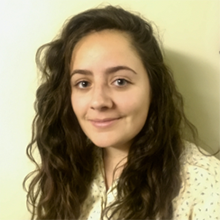 Allison Coomber
Allison Coomber
Functional Genomics
Ph.D. Student | College of Sciences | Location: Thomas Hall 1549 | acoombe@ncsu.edu| LinkedIn
What AgBioFEWS means to me: “My goal as an AgBioFEWS fellow is to bring my passion for plant science as well as my experience with collaborative projects to the program in order to form sustainable solutions to the challenges facing our food, energy, and water systems.”
Allison received her B.S. in Plant Science with a focus in plant breeding from Cornell University in 2018. At Cornell she conducted research in Dr. Gary Bergstrom’s plant pathology lab, culminating in the thesis “Mixed species intercropping mitigates plant disease in organic forage systems.” She also had the opportunity to architect a new program for mentoring incoming students. During her last two years at Cornell she mentored ten incoming students through weekly meetings and discussions. She thrives in environments that foster innovation and is passionate about plant science, genetics, and genomics. Currently, she is a first year Ph.D. student doing research rotations. In the future, she hopes to work in industry as a plant breeder.
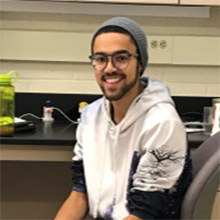
DeShae Dillard
Entomology
Ph.D. Student | College of Agriculture and Life Sciences | Location: Gardner Hall 2322| ddillar2@ncsu.edu| LinkedIn | CV
What AgBioFEWS means to me: “I believe the AgBioFEWs fellowship is an exemplary example of forging diverse disciplinary relationships in order to explore complex overarching questions with a novel approach. Participation in this fellowship gives students the opportunity to engage in research that is broader in scope so they are able to gain a sense of the indirect interactions their individual interests have with the greater scientific community and the general public.”
DeShae received his B.A. in Biology with a Research Concentration from Gonzaga University. Utilizing his background in secondary education, he has organized numerous outreach events with the intent of generating interest in local biodiversity for youth residing in surrounding low-income public schools. Outside of community interests, he has maintained a strong focus in academia and continues to seek a wide variety of experiences to further diversify his abilities to ensure success within the field of integrated pest management. For his graduate studies, he sees his background as playing a vital role in extension and finding a way to close the rift that exists between the scientific community and the general public.
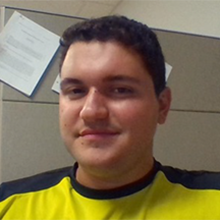 Dalton George
Dalton George
Forestry and Environmental Resources
Ph.D. Student | College of Natural Resources | Location: Jordan Hall Addition 5213 | drgeorg2@ncsu.edu | ResearchGate | CV
What AgBioFEWS means to me: “The AgBioFEWS fellowship provides the opportunity to perform interdisciplinary research and develop capacity with new skills and methods, which has always been a priority for me. As an AgBioFEWS fellow, the interactions and collaborations with my cohort pushes my ability to see complex problems through multiple lenses, hopefully paving the way to unique and effective forms of problem solving.”
Currently Dalton is a PhD student at North Carolina State University in the Forestry and Environmental Resources department, and an affiliate of the Genetic Engineering and Society Center. Dalton has a B.S. from Michigan State University, where he majored in Molecular Biology and Minored in the History, Philosophy, and Sociology of Science. He earned his M.S. at Drexel University in Science, Technology, and Society Studies, with focused research interests on the social and political dimensions of human gene editing.
At NC State, he is investigating questions across different realms of Emerging Science and Technology Governance, specifically those relating to genetic engineering applications in the environment and agriculture. He has been involved in a diversity of projects, focusing on topics such as the Genetically Engineered American Chestnut Tree, Gene Drive Mice, Gene Edited Crops, and The DIY Biology Community.
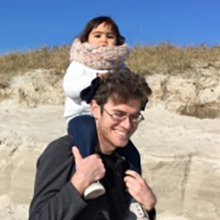 Eli Hornstein
Eli Hornstein
Plant and Microbial Biology
Ph.D. Student | College of Agriculture and Life Sciences | Location: Partners III Room 205A| edhornst@ncsu.edu| Sederoff Lab
What AgBioFEWS means to me: “Being an AgBioFEWS fellow means that I work with peers and professors who expand my understanding of the complex context in which agricultural biotechnology is deployed. I take this understanding back to the lab and use it to figure out how to make new biotech inventions that are intended to adjust the boundaries of agriculture towards greater environmental sustainability.”
Eli simultaneously attended Duke and the University of North Carolina, via the Robertson Scholarship. He studied ecology and evolution at Duke, while graduating with a BA in linguistics from UNC. He is now a fourth-year PhD candidate in Plant Biology at NC State; his research deals with applying biotech to sustainability. Eli’s goal is to use biotechnology to face otherwise insurmountable problems of conservation and sustainability. His thesis research is an attempt to insert synthetic gene circuits that restore a plant-fungal symbiotic association called mycorrhizae to crop plants of the mustard family (canola, cabbage, broccoli) which have naturally lost them. As mycorrhizae in most plants improve growth under resource-scarce conditions, re-engineering this relationship has potential to reduce the amount of fertilizer and water needed for agriculture. Because mycorrhizae stop working when nutrients are overabundant, this work also has the goal of producing a biotechnology invention which does not provide any incentive to overuse resources.
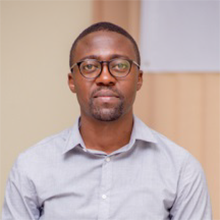 Nassib Mugwanya
Nassib Mugwanya
Agricultural and Extension Education
Ph.D. Student | College of Agriculture and Life Sciences | Location: Thomas Hall 1549 | nmugwan@ncsu.edu | LinkedIn | Twitter
What AgBioFEWS means to me: “The AgBioFEWS fellowship to me is a scholarly environment where different perspectives on the potential of biotechnology in solving complex agricultural and environmental challenges in different contexts are warmly welcome.”
Nassib is a Doctoral student of Agricultural and Extension Education in the Department of Agricultural and Human Sciences. He is interested in how scientists and extension workers can engage effectively with diverse publics on complex and emerging agricultural technologies. Prior to NC State, Nassib worked with the National Crops Resources Research Institute in Uganda, where he was involved in educational and outreach engagements on biotechnology among smallholder farmers. He has a BSc. in Agriculture and MSc. in Agricultural and Extension Education from Makerere University, Uganda.
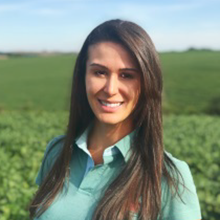 Daniela Pezzini
Daniela Pezzini
Entomology
Ph.D. Student | College of Agriculture and Life Sciences | Location: Gardner Hall 2322 | dtpezzin@ncsu.edu | LinkedIn | CV
What AgBioFEWS means to me: “AgBioFEWS has changed the way I think about how science is shaped by and how it shapes individuals’ values, policies and society. It has given me a different perspective of the complex issues agriculture is embedded in through a deeper understanding of the connection between social and natural sciences.
Daniela holds a BA in Crop and Soil Sciences from the Federal University of Santa Maria in Brazil and a MS from the University of Minnesota, where she conducted a 9-state multi-year project to address important questions related to the increased threat posed by stink bugs to soybean farmers. Her MS thesis focused on Integrated Pest Management (IPM) practices and aimed to characterize the stink bug community while developing a sequential sampling plan for stink bugs in soybean in the North Central Region of the U.S.
For her PhD, she is focusing on the impact of blended and structure refuge strategies on the development of resistance of the earworm to Bt toxins in corn. Going from the field to the lab, her project covers the biology and behavior of resistant insects and how these are associated with individuals expressing resistant genes. For her AgBioFEWS chapter, she aims to understand growers’ practices and decision making on pest management in Brazil and investigate possible outcomes, practical feasibility and implementation of IPM in the future.
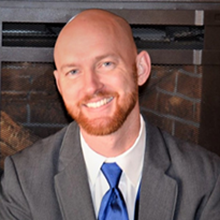 Casey Rozowski
Casey Rozowski
Agriculture and Resource Economics
Ph.D. Student | College of Agriculture and Life Sciences | Location: Nelson Hall 4223A | crozows@ncsu.edu | LinkedIn | Website | CV
Casey has undergraduate degrees in Mathematics and Literature as well as Master’s degrees in Applied Economics and Financial Mathematics. Casey is a third-year doctoral student in Economics at NC State University. His primary research interests include energy & environmental economics, health economics, and agricultural and resource economics. Casey is currently researching the health effects from air pollutant exposure and the role of renewable energy and abatement technologies. He is also applying partially observable Markov decision processes in adaptive harvest management and is performing joint research with the U.S. Geological Survey on adaptive management programs for endangered species.